Access the campaign at https://twitter.com/DemandInclusion
Facebook: https://www.facebook.com/demandinclusion/ …
Instagram: https://www.instagram.com/demandinclusion/ …
Website: https://demandinclusion.wordpress.com/
(Public Education page in progress to provide facts and refute the position of the STOP SOP slate.)
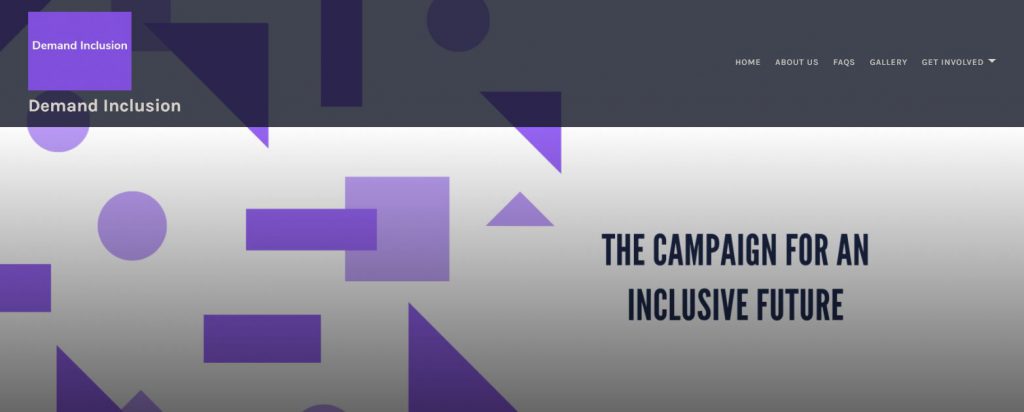
What is happening in the legal profession?
In 2016, the Law Society of Ontario (“LSO”) adopted the report of the Challenges Facing Racialized Licensees Working Group. That report identified a number of steps that the LSO needed to take in order to promote equality, diversity and inclusion (“EDI”). One of those steps was requiring every licensee (every lawyer and paralegal) to adopt a personal, confidential ‘Statement of Principles.’
That Statement of Principles requirement has now become a flashpoint that has divided the professions. [And, in a great betrayal of trust, Ernst’s lead lawyer, Murray Klippenstein, quit because of it, after Ernst gave 11 years and nearly $400,000.00 to her lawsuit. Ernst still fully supports the Law Society of Ontario’s SOP and sees it starting direly needed positive change in the legal profession across Canada.]
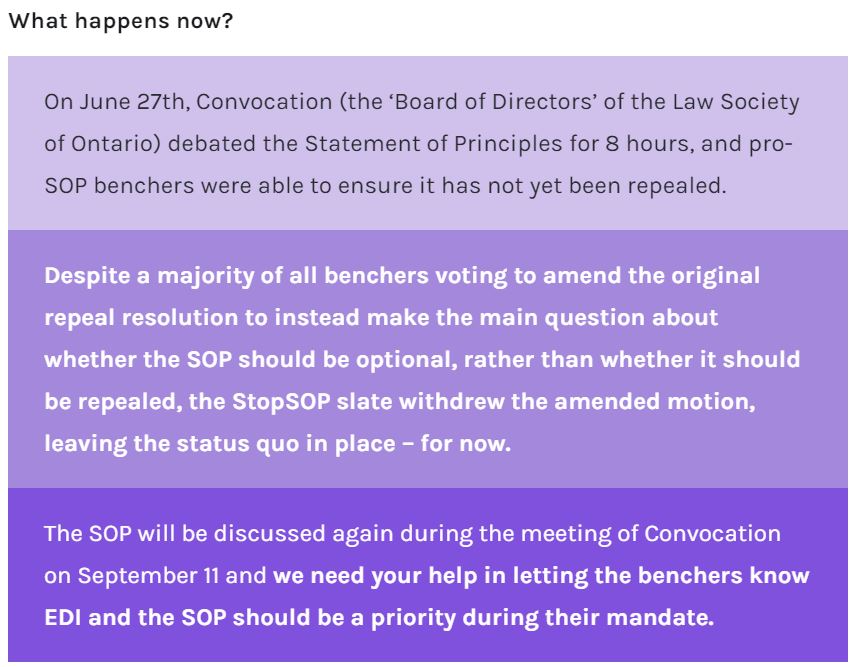
DemandInclusion Basics & Challenging Misinformation
On September 11th, 2019, Convocation will be considering a motion on the Statement of Principles (SOP) and whether it should be sustained, revised, or repealed. The SOP is one of several recommendations that were meant to address systemic racism in the legal profession.
Given the amount of misinformation being spread about the nature of the SOP, this FAQ was prepared with a view to clarifying what the SOP actually is and does to promote accurate and productive dialogue on its merits.
OVERVIEW
- What is Demand Inclusion?
- What is the SOP?
- What values motivate the SOP?
- Why was the SOP recommended
- What does the SOP require?
- What does the SOP not require?
- Why are some people linking the SOP debates to North Korea, Nazi Germany, Communist Russia, Communist China, and the Pol Pot regime?
- Where can I get further information about the importance of SOP?
- How can I get involved with Demand Inclusion?
1. What is Demand Inclusion?
We are an equity-seeking group trying to inform the legal community of the historical barriers faced by racialized lawyers. We were created in response to the STOP SOP slate from the LSO Bencher Elections.
For more, click our Law Times story: https://www.lawtimesnews.com/…/diversity-group-forme…/263536
2. What is the SOP?
The SOP is a requirement for all Law Society licensees to adopt an individual Statement of Principles that acknowledges their obligation to promote equality, diversity and inclusion generally, and in their behaviour towards colleagues, employees, clients and the public.
3. What values motivate the SOP?
The values at the centre of the SOP are Equality, Diversity, and Inclusion (EDI). These three values, as well as the obligation of all members of the Law Society of Ontario (LSO) to promote them, are not new; rather, they are enshrined — either explicitly or implicitly — within the special parameters set out for legal professionals in the Rules of Professional Conduct (under 2.1 and 6.3.1), for paralegal professionals in the Paralegal Rules of Conduct (under 2.01 and 2.03), and more broadly within human rights legislation (the Ontario Human Rights Code and the Canadian Human Rights Act).
The SOP requirement has a modest objective: as put by the LSO, the requirement exists “to create awareness among lawyers and paralegals about their professional responsibilities in upholding our laws”. The SOP is part of a set of strategies established by the Challenges Faced by Racialized Licensees Working Group, the main objectives of which concern the creation of more inclusive legal work spaces, reducing barriers created not only by racism, but also unconscious bias and discrimination, and remedying the underrepresentation of racialized licensees. The SOP does not create new substantive obligations; instead, it is a mechanism for ensuring that licensees are aware of and committed to existing legal and professional obligations they have undertaken as members of the Law Society. By requiring licensees to articulate the guidelines or criteria that influence their professional conduct in relation to EDI, the SOP requirement promotes awareness of these values, reaffirms their importance, and encourages licensees to actually consider the ways in which they can engage with these principles for the betterment of the profession.
4. Why was the SOP recommended?
The SOP is Recommendation 3(1) out of 13 total recommendations made in the Final Report by the Challenges Faced by Racialized Licensees Working Group. Its specific goal is to promote EDI principles and practices. These recommendations were devised in part through an exhaustive engagement and consultation process with opportunities for the input of all licensees in order to address the issue of systemic racism within the profession.
The SOP acknowledges a general responsibility to promote equality, diversity and inclusion. Since racialized individuals have historically faced barriers to accessing justice and legal careers, addressing systemic racism is a central goal of the SOP. Specifically, a working group at the LSO recommended the SOP after its consultations demonstrated systemic racism in Ontario’s legal institutions.
The working group noted that race and racism are at the forefront of issues in the justice system — from the overrepresentation of Black and Indigenous people in federal prisons, to police violence and calls for judicial diversity. The consultations revealed that “discrimination based on race is a daily reality for many racialized licensees” and that “although racism can be experienced on an individual basis, racial discrimination can also be institutional or systemic in nature.”
The anti-SOP group [includes Ernst’s past lawyer, Murray Klippenstein; he quit her lawsuit to fight the SOP] simply ignores the evidence and denies that systemic racism exists. One anti-SOP bencher even blamed racialized individuals for lacking a “culture of learning” to justify why racialized licensees are underrepresented. This disregards an extensive body of statistics, research, and anecdotal evidence showing that our current legal institutions create structural barriers to racialized licensees.
5. What does the SOP require?
The SOP requires each LSO licensee to adopt and abide by an individually drafted Statement of Principles that acknowledges their professional obligations to promote equality, diversity and inclusion generally, and in one’s behaviour towards colleagues, employees, clients and the public. There is no prescribed form for the SOP, but templates are provided by the LSO for reference. Each licensee is then required to confirm in their annual reports that they have considered and implemented this requirement. In sum, the SOP only requires that each licensee draft a document acknowledging their existing professional obligations relating to EDI.
6. What does the SOP not require?
The SOP is not about free speech scrutiny
The opposition to the SOP, as some commentators have put it, is pro-speech in form, but anti-diversity in substance. For instance, LSO bylaws require those applying for licenses to publicly take an oath as a condition of being a licensee. That oath requires applicants to publicly declare, among other things, that they will “champion the rule of law and safeguard the rights and freedoms of all persons”. The fact that this public, state-crafted, mandatory oath remains largely unchallenged, while the private, non-coercive SOP requirement inspires vitriolic opposition shows that it is the substance of the SOP that is at issue, not free speech. Indeed, while SOP opponents claim their position is about freedom from compelled speech, they voted against making the SOP voluntary.
The SOP is not coercive
Licensees are not required to disclose the content of their SOP to the LSO. If licensees do not prepare an SOP, they are not suspended or otherwise penalized, although they will be encouraged to adopt and abide by one in the future. Although the LSO tracks general compliance rates — which was 98% in 2017 — it does not reveal those who are non-compliant.
The SOP does not compromise the independence of lawyers to impartially represent clients
Some argue that the SOP requirement will result in lawyers being unable to impartially represent clients who, for instance, are alleged to have violated human rights codes that enshrine anti-discrimination protections. This is false. Acknowledging existing regulatory obligations — none of which limit a lawyer’s capacity to represent clients whose beliefs or conduct may undermine principles of equality — does not compromise lawyers’ independence.
In any event, lawyers do not need to condone the actions or values of their clients to provide impartial and effective representation. For example, criminal defense lawyers need not condone the alleged actions of their clients to impartially represent clients and abide by their professional obligations.
6. Why are some people linking the SOP debates to North Korea, Nazi Germany, Communist Russia, Communist China, and the Pol Pot regime?
The anti-SOP group has repeatedly compared the SOP requirement to the policies of various totalitarian regimes. This rhetoric is hyperbolic, avoids meaningful analysis, and instills irrational fear. These totalitarian references are a ruse to distract from the real issue and propagate misunderstandings about the SOP.
An annual regulatory statement acknowledging one’s existing professional obligations simply bears no resemblance to political tyranny.
7. Where can I get further information about the importance of SOP?
* Omar Ha-Redeye, What the statement of principles controversy is really about
* Joshua Sealy-Harrington, Confusing Equality with Tyranny: Repealing the Statement of Principles
* Fred Wu, Statement of principles is a good thing to do
* Atrisha Lewis, Repealing Ontario lawyers’ statement of principles is not a principled stand
* Mary Eberts, Heather J. Ross, Nadine Otten, Not Tyranny: Reflections on the Law Society of Ontario Statement of Principles
* Solomon McKenzie, Voting For or Vetoing Diversity?
How can I get involved with Demand Inclusion?
Join our photo campaign.
A few examples
This one is heart breaking and extremely worrying:
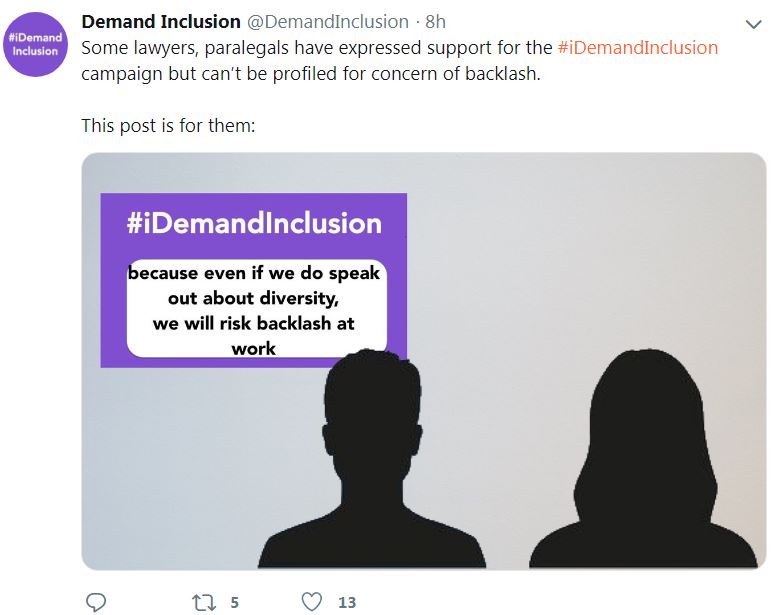
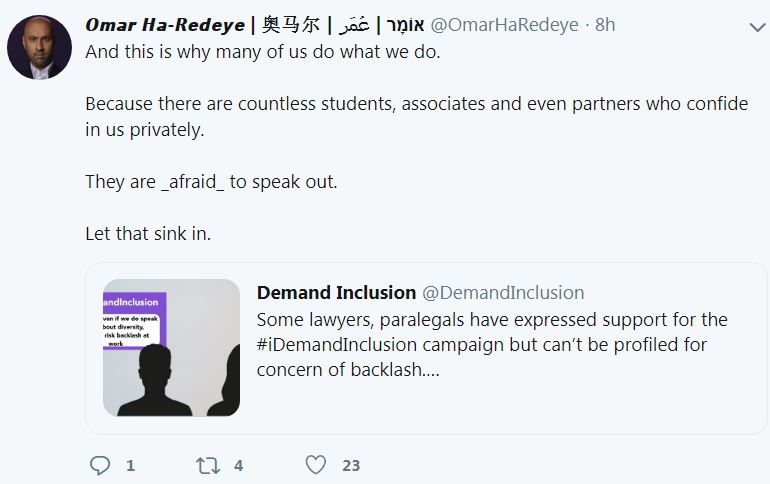
Ben with guide dog Abbie:
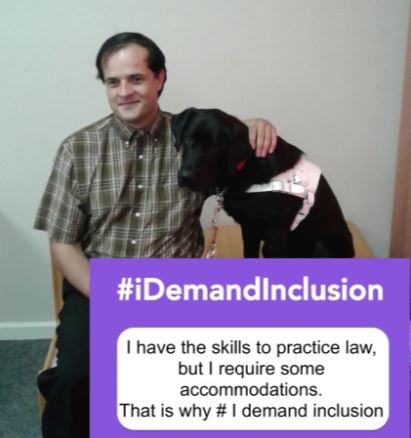
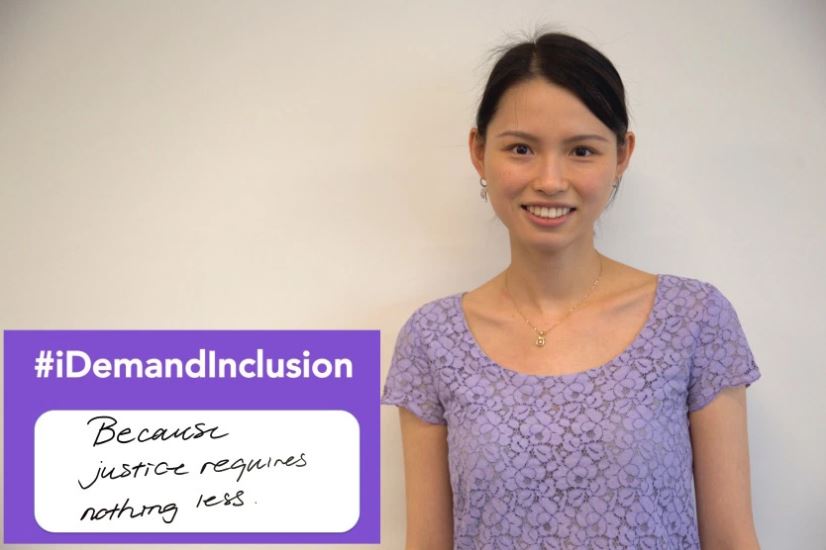
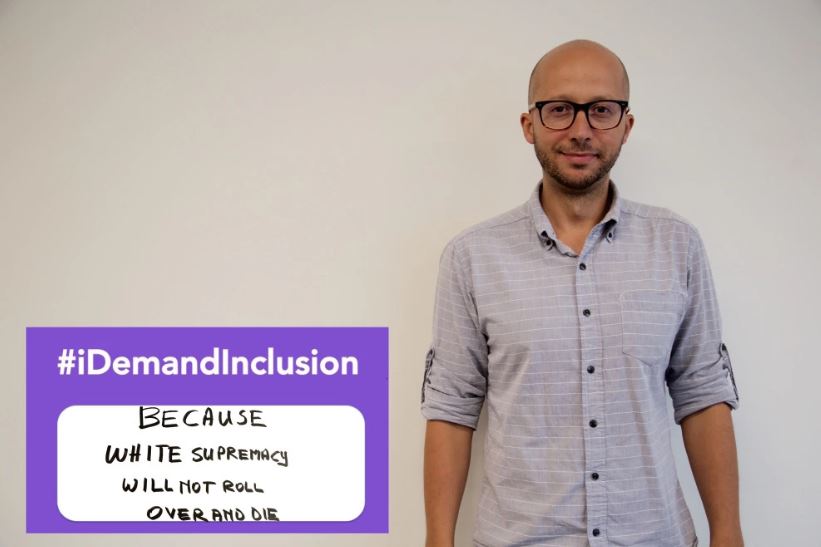
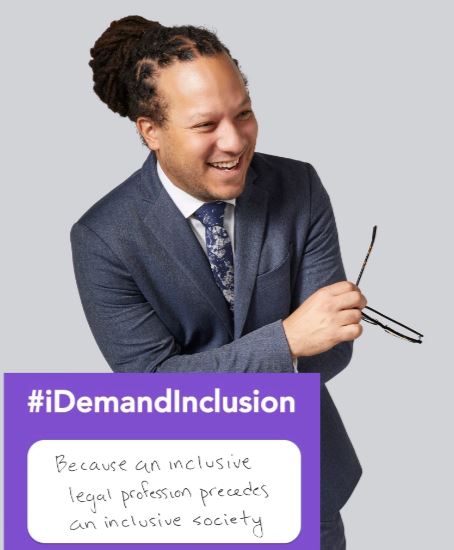
You can join one of our committees by emailing: email hidden; JavaScript is required
Follow us on Facebook, Twitter and Instagram.
We follow the hashtagh #IDemandInclusion. Share your story with us!
***
Freedom of thought and expression by Ernst below:
Or are non-lawyer Canadians not allowed this right?
That’s how Stop SOP lawyers make me feel.
I worked most of my career in Alberta’s oil patch, a racist, sexist, misogynistic, abusive industry, in a racist, sexist, misogynistic, abusive province. I’ve experienced a lot of abuse and I’m white; I can’t begin to image the hell I would have experienced if I were not. I demand inclusion, in all professions and all things, for all peoples, everywhere – especially in red-necked Alberta, land of the big sky that I love so dearly.
It behooves me to understand how Klippenstein and the rest of the Stop SOP bunch can be opposed to the SOP, or, in other words, opposed to kindness, sharing, goodness, much needed healing, nurturing, and fairness. Has the legal profession become inhumane? To toss aside a litigant and destroy a civil lawsuit to coddle frightened white male egos?
Refer also to:
Some coverage of the June debate [A2J = Access to justice] and other legal matters of concern:
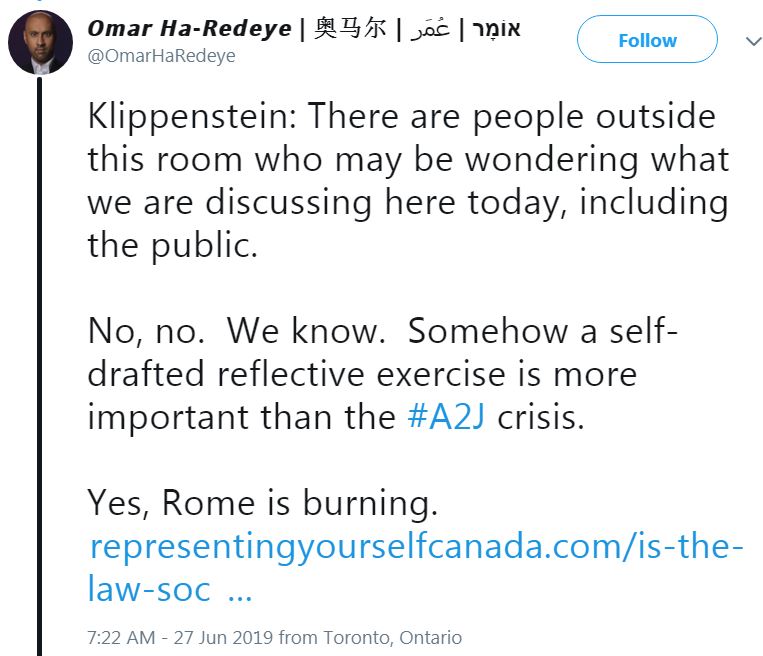
2019 Profile of the Legal Profession [in USA] Report article on it: https://www.techlawcrossroads.com/2019/08/aba-profile-reveals-a-profession-in-crisis/
Diversity? Not So Much
A whopping 85% of the profession is still white. 85%.
For example, while the Report’s introduction points out that the profession changes every year, much of the story contained in the Report is unfortunately the same. For example, a whopping 85% of the profession is still white and mostly male. 85%.
Minorities compose only some 8% of the partners in law firms, roughly the same as in 2016 and not a whole lot better than 10 years ago.
80% of our federal judges are white. Almost 75% are men. That’s an incredible lack of progress for a key metric. [White men don’t like to share power do they?]
… The Report also reveals what most of us would have assumed: public service lawyers are grossly underpaid with civil legal aid lawyers being paid on average the least of the least. Its no wonder we have an access to justice problem.
… 21% of lawyers report problem drinking; 32% of lawyers under 30 report problem drinking. This compares to 6.4% of the general population. 25-35% do lawyers facing disciplinary proceedings report some mental illness or addiction issue.
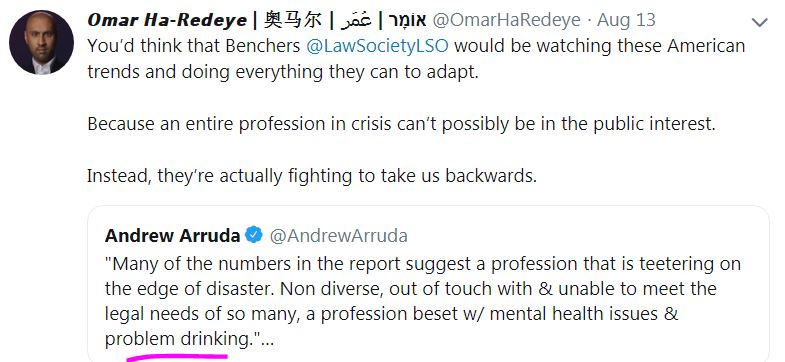
How prevalent is racism (and misogyny) among Canadian lawyers & judges?
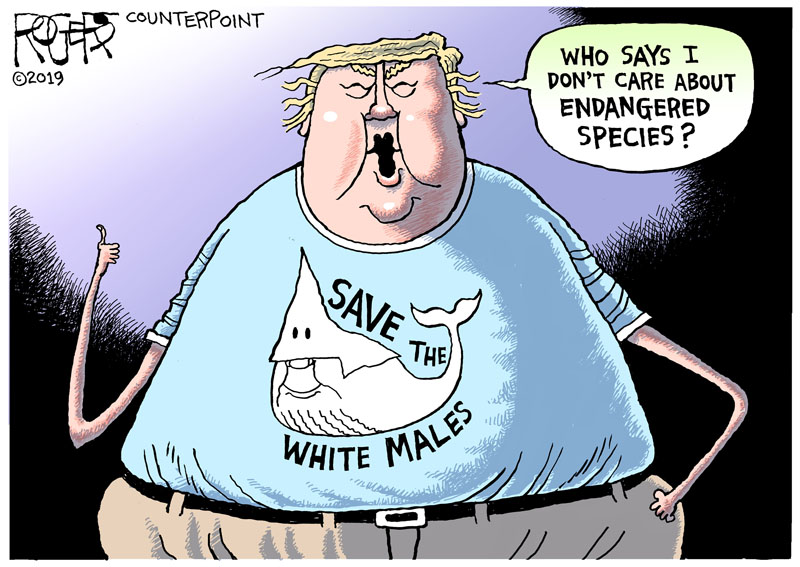
Cartoon by Rob Rogers
